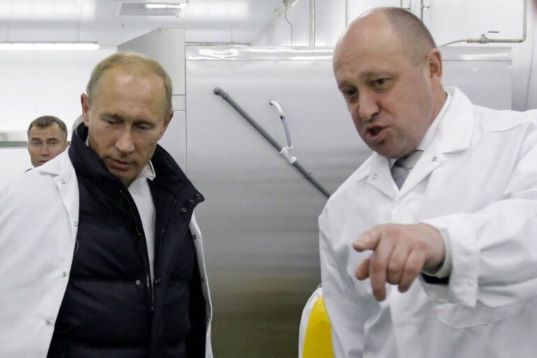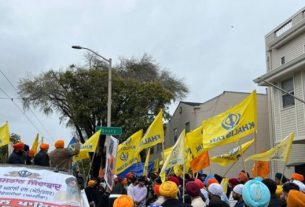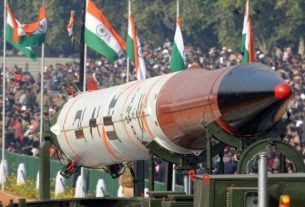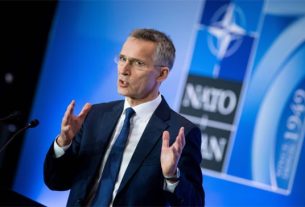MOSCOW: The chief of the rebel Wagner mercenary force will leave Russia and won’t face charges after calling off his troops’ advance on Saturday, Moscow said, easing Russia’s most serious security crisis in decades.
The feud between Wagner chief Yevgeny Prigozhin and Russia’s military brass came to a violent head in the past day, with his forces capturing a key army headquarters in southern Russia and then heading north to threaten the capital.
Within hours of Prigozhin’s about-face, the Kremlin announced he would leave for Belarus and Russia would not prosecute either him or the group’s members.
It had been a dramatic day of developments, with President Vladimir Putin warning against civil war, Moscow telling locals to stay off the streets and Kyiv revelling in the chaos engulfing its enemy.
The tide shifted suddenly when Prigozhin made the stunning announcement that his troops were “turning our columns around and going back to field camps” to avoid bloodshed in the Russian capital.
Prigozhin, who has feuded bitterly with Moscow’s military leadership even as his outfit led parts of Russia’s Ukraine offensive, said he understood the importance of the moment and did not want to “spill Russian blood”.
Wagner troops cheered
By early Sunday Wagner had pulled fighters and equipment from Rostov-on-Don, where they had seized the military headquarters, said the regional governor.
But before they left, dozens of residents were cheering and chanting “Wagner! Wagner!” outside the military headquarters they had captured.
Authorities in the southern Lipetsk region announced the lifting of restrictions after earlier reporting Wagnerfighters in their territory, where the local capital is just 420 kilometres (260 miles) south of Moscow.
Belarusian leader Alexander Lukashenko said he had negotiated a truce with Prigozhin, drawing thanks from Moscow.
Kremlin spokesman Dmitry Peskov later told reporters that the “criminal case against him (Prigozhin) will be dropped. He himself will go to Belarus.”
Peskov also said that members of Wagner who had taken part in what authorities termed an “armed rebellion” will not be prosecuted.
“Avoiding bloodshed, internal confrontation, and clashes with unpredictable results was the highest goal,” Peskov added.
Kyiv revelled in the chaos that engulfed its enemy.
“Prigozhin humiliated Putin/the state and showed that there is no longer a monopoly on violence,” presidential aide Mykhailo Podolyak said on Twitter.
While Russia claimed the rebellion had no impact on its Ukraine campaign, Kyiv said the unrest offered a “window of opportunity” as the nation pressed its long-awaited counter-offensive.
Moscow’s warning
The United States and its allies publicly stayed on the sidelines as officials waited to see how the revolt would play out.
US President Joe Biden spoke with the leaders of France, Germany and Britain amid concerns that Putin’s control over the nuclear-armed country could be slipping.
Moscow issued a stiff warning to the United States and its allies to stay back.
“The rebellion plays into the hands of Russia’s external enemies,” the foreign ministry said.
Before Prigozhin’s climbdown, Russian regular forces had launched what one regional governor called a “counter-terrorist operation” to halt the Wagner advance northwards up a main highway towards Moscow.
In the capital, the mayor urged Muscovites to stay indoors and declared Monday a day off work.
Security was tightened in the city centre, with armed men in flak jackets guarding the parliament building and Red Square closed off to the public.
“I don’t know how to react. In any case, it’s very sad this is happening,” 35-year-old Yelena told AFP, declining to give her last name.
The measures came after Prigozhin announced his troops had taken control of the military command centre and airbase in the southern city of Rostov-on-Don, the nerve centre of Russia’s offensive in Ukraine.
‘A blow to Russia’
Responding to the challenge in a televised address, Putin accused Prigozhin of a “stab in the back” that posed a threat to Russia’s very survival.
“Any internal turmoil is a deadly threat to our statehood and to us as a nation. This is a blow to Russia and to our people,” Putin said, demanding national unity.
“Extravagant ambitions and personal interests led to treason,” Putin said, referring to Prigozhin, who began building his power base as a catering contractor.
Another Putin ally, Chechen strongman Ramzan Kadyrov, declared that he had dispatched his own units to help quash the Wagner rebellion.
Armed Wagner fighters deployed around administrative buildings in Rostov and tanks were seen in the city centre.
As the insurrection force headed north through Voronezh and Lipetsk towards Moscow, the capital’s mayor announced that “anti-terrorist” measures were being taken.
Critical facilities were “under reinforced protection”, TASS reported, citing a law enforcement source.
While Prigozhin’s outfit fought at the forefront of Russia’s offensive in Ukraine, he repeatedly blamed Defence Minister Sergei Shoigu and Valery Gerasimov, chief of the general staff, for his fighters’ deaths.__Pakistan Today





